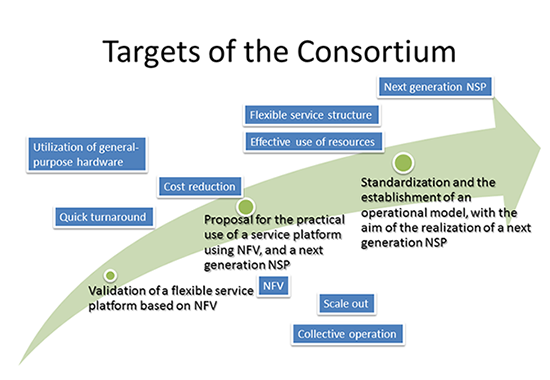Next Generation Network Service Platform Consortium
* This laboratory has been completed.
Objectives and Activities
The current Internet service providers use devices designed for specific applications and communication protocols and connect them to perform packet processing. The cost of operating and maintaining such network services has become a runaway trend, which requires us to seek a radical solution. Furthermore, it is expected that communication models for Internet applications will be shifted to new types, such as user-to-user communication models (e.g. WebRTD), and transport models with HTTP2.0 that focus on encryption and higher speeds (e.g. SPDY and QUIC). In order to handle such new communication models, we need to develop a more dynamic infrastructure that will enable the establishment of or shift to new network services, which is the main research subject of our consortium: the next generation network service platform.
For this platform, we will aim to realize new architecture for the whole Internet. It will be designed with SDN (Software Defined Networking) and NFV (Network Function Virtualization) as its element technology, and based on a network service positioning that is not influenced by locations and topology. With regard to NFV, we will separate hardware and software by the establishment of network functions implemented in software on a platform constructed with general-purpose hardware and standard virtualization technology. Due to this, we will be able to enjoy a number of advantages, including lower costs, shorter time for service establishment, greater flexibility, and larger scale, in comparison with the conventional network systems that have been operated with specific hardware. NFV has been standardized by the ETSI, and its network section to connect services has also been in the process of standardization by IETF. However, there are still a number of tasks remaining, and these include the development of a framework that can support quality and performability of network services using general-purpose hardware and virtualization technology; consideration of uniform guidelines and methods for evaluation and verification; and dealing with MANO (Management And Orchestration) to manage the complex NFV as a uniform system. Therefore, testing and data measurement and disclosure on a practical use basis are required for the purpose of development and generalization of NFV.
As NFV is an important element technology for the next generation network service platform, this consortium conducts data measurement through the evaluation of NFV from various angles in order to investigate the specifications and technology for standardization that are required toward the implementation of real services. It also promotes NFV to be applied to real network services, through the efficient operation of a platform for evaluation and development of software that will be required for the implementation of real networks. Through these various studies, it aims to design, implement, and test a next generation network service platform.

Research Procedures
- Survey of the current NFV trends
- Study into new network architecture that is compatible with next generation applications
- Establishment of a platform to test NFV-related hardware and software
- Investigation of NFV-related items that should be evaluated, and the creation of an objective testing scenario
- Creation of a data model that contains resources for NFV
- Conducting of plugtests for performance and interoperability using hardware and software brought in by participating companies
- Development of an NFV operation management system based on the insight acquired from testing
- Disclosure of test result data
- Proposal for standardization based on data
Researchers, managers and professors
| Jun MuraiDirector | Professor, Faculty of Environment and Information Studies Consortium leader |
|---|---|
| Osamu Nakamura | Professor, Faculty of Environment and Information Studies Consortium leader (Co-representative) |
| Yuji Sekiya | Senior Researcher, Keio Research Institute at SFC Associate Professor, Information Technology Center, The University of Tokyo Project leader for validation, implementation and standardization |
| Seiya Aoki |